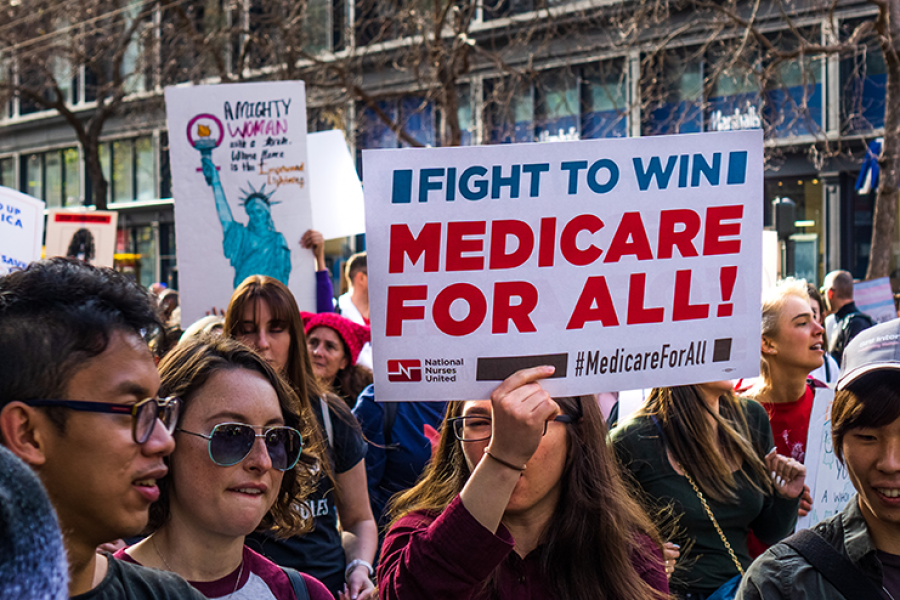When Inside California Politics host Frank Buckley asked California Assembly Speaker Anthony Rendon whether he feels differently about the new attempt to bring single-payer health care to California (AB 1400) versus the last bill in 2017 (SB 562), Rendon replied, “that was really you know a cynical attempt I think to get headlines, this is a real proposal with a real funding mechanism.…”
And what a funding mechanism it is.
The Tax Foundation’s Jared Walczak said it would mean that taxes will increase a whopping $12,250 per California household. The top marginal rate on wage income would rise to 18.05 percent (nationally, the median top marginal rate is 5.3 percent) and the state would adopt a new 2.3 percent gross receipts tax (GRT), at a rate more than 3x that of the U.S.’s highest current pure GRT. All this to fund single-payer’s price tag at $163 billion. To put this into context, Gov. Newsom’s proposed budget to fund the entire government in the upcoming fiscal year is $286 billion.
The new taxes would take three forms:
- Surtaxes atop the current individual income tax structure beginning at $149,509 in income;
- A graduated-rate payroll tax system with the top rate kicking in for employees with more than $49,990 in annual income; and
- A gross receipts tax of 2.3 percent, excluding the first $2 million of business income.
For individuals and businesses thinking of fleeing the state, this proposal might seal their decision.
For California Residents
AB 1400 would add a payroll tax of up to 2.25 percent over an individual income tax that already has a top marginal rate of 13.3 percent. With the proposed 2.25 percent payroll tax, the combined top marginal rate would be 18.05 percent. The Tax Foundation writes that it is more than 7 percentage points higher than the next-highest rates in Hawaii (11 percent), New York (10.9 percent), and New Jersey and the District of Columbia (both at 10.75 percent). In addition, under the new tax proposal, the state’s already progressive tax system would expand to 18 brackets and taxpayers earning less than $50,000 may find themselves in double-digit marginal tax rates according to the Tax Foundation.
For California Businesses
Some states favor taxing gross receipts over a corporate income tax. But California businesses will be facing both. According to the Tax Foundation, the 2.3 percent gross receipts tax would be added on top of property taxes and an 8.84 percent corporate income tax with a worldwide tax base.
Walczak points out that for low-margin businesses such as supermarkets, 2.3 percent of gross receipts tax could exceed company profits: “Kroger’s profit margins dipped to 0.75 percent in late 2021 and have historically hovered around 1.75 percent. These taxes are even worse for businesses posting losses, including startups that haven’t turned profitable yet, because they are taxed on their receipts even if their expenditures exceed revenues. For startups, a high-rate gross receipts tax could be disastrous.”
The payroll tax would exempt employers with fewer than 50 resident employees, which will punish businesses from expanding. “Imagine,” said Walczak, “a company with 49 employees making $80,000 each. At 49 employees, the company has no payroll tax burden. Hiring one additional employee generates a tax bill of $90,000—more than that employee’s salary!”
The proposed tax hike, which will amend the state’s constitution, would also make it easier for Sacramento to raise taxes. Tax increases will only need a simple majority vote (currently it requires a two-thirds vote) in the legislature in order to get on the ballot for voter approval. Whether the funding mechanism will be met with more cynicism or enthusiasm is anybody’s guess. Newsom appears to be more excited about his proposal to fully fund health care for undocumented immigrants.
“The financial cost of a statewide single-payer system is just one of the reasons to fear such an overhaul,” writes PRI President & CEO Sally Pipes, “By putting the government in charge of financing the provision of medical care, lawmakers are guaranteeing a future in which disruptions in health care access are endemic, wait times excessive and resources forever stretched thin.” For more of Sally Pipes’ thoughts on California’s proposed single-payer health care system, check out the podcast interview on Next Round.
Rowena Itchon is senior vice president of the Pacific Research Institute.


